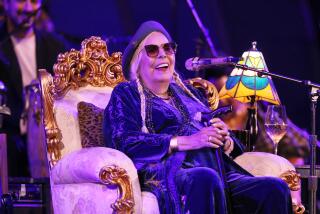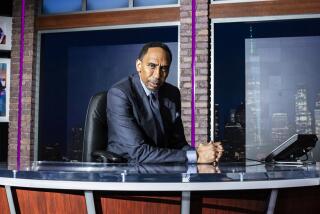Waving Her Right
The two lines are consistently sung as a declaration, but Francis Scott Key actually wrote them as a question.
“O say, does that star-spangled banner yet wave, O’er the land of the free and the home of the brave?”
Every day across our sports landscape, the question is asked.
Every day, with dizzy crooners serenading fidgety athletes, it essentially goes unanswered.
Until now, when an unremarkable college basketball player in a tiny gym makes a 90-degree declaration that fills the air with those splendidly bursting bombs of public discourse and debate.
Yes, that star-spangled banner does yet wave, because Toni Smith is able to turn her back on it.
*
She is barely a rebel, hardly a renegade.
What Toni Smith is, is a reminder.
With our country on the verge of war, she is a reminder of why this country has warred before.
Her decision to turn her back on the flag during the national anthem before Division III Manhattanville College’s games this season is no less a celebration of freedom than the cries from those who call her a traitor.
And there has been plenty of that, from friend and foe alike, free-speech beneficiaries ironically encouraging her to put a sock in it.
Some opposing fans have jeered her with chants of “Leave our country!” Others have serenaded her with “God Bless America.”
Her own student council purchased tiny flags and passed them out to her classmates. Some of her teammates even began wearing red, white and blue headbands.
Then there was Vietnam veteran Jerry Kiley, who ran onto the court during a game last weekend and waved a flag in her face.
He was thrown out of the gym and threatened with arrest if he returned during the season.
“I agree with freedom of speech,” Kiley said when reached on his cell phone while protesting outside of Brown’s final home game Thursday. “But just because you can do something doesn’t mean you should do something, especially if it’s immoral.”
As opposed to doing something illegal? Like trespassing?
I don’t agree with what Toni Smith has done.
But I am thankful to live in a country where she can do it.
As the son and grandson of veterans, I can barely stand to look at the pictures of her protest.
But I would hate to live in a country where she could not be seen.
“I never meant this to be a public statement, I did it for my own self-respect and conscience,” said Smith, a 21-year-old senior, talking to reporters on her campus near New York City this week in her first interview since the world took notice of her action. “I know the flag represents people who have died for this country and I support them. But the flag means different things to everyone.”
She said that, to her, the flag currently represents a power-hungry country that is mistakenly focusing on Iraq instead of problems closer to home.
“A lot of people blindly stand up and salute the flag, but I feel that blindly facing the flag hurts more people,” she said. “There are a lot of inequities in this country, and these are issues that needed to be acknowledged. The rich are getting richer and the poor are getting poorer, and our priorities are elsewhere.”
She is the first athlete to make a statement about the possible war, but she will not be the last. She might not have the knowledge or experience or credibility, but she has the platform, and she is going to use it, and why not?
Sporting events have long since replaced town meetings as our most popular public places of discernment and debate.
If Pee Wee Reese had put his arm around Jackie Robinson in a city council chamber, do you think it would have had the same impact on race relations as when he did it on a ball field?
Those who study female empowerment through surveys and statistics need only to buy a ticket to a WNBA game.
Looking through the prism of sports, we are better able to understand complicated issues such as violence, morality and money.
And, yes, sometimes even freedom.
We don’t have to agree with Toni Smith. But give her credit for illustrating again that the true power of sports lies in making us think.
“Athletes are representative of the society in which we live,” John Carlos said. “If athletes can’t make a statement, who can?”
You remember John Carlos.
In 1968 at Mexico City, in a gesture worth 1,000 Toni Smiths, Carlos and U.S. teammate Tommie Smith held up gloved fists while on the podium during a medal ceremony.
They were protesting race relations. Nobody wanted to listen. They were thrown off the team and expelled from Mexico.
“And I’d do it again, lickety-split,” said Carlos, who works in the counseling department at Palm Springs High.
He understands, more than anybody, that a protest at athletic events is a protest heard.
“I don’t know much about what’s going on with that little girl,” he said of Toni Smith. “But I feel her.”
Without being told of Smith’s feelings, he eerily echoed them.
“My act in Mexico City was an act of love, and her act is an act of love,” he said. “No matter what all those so-called patriots think.”
There was much talk about patriotism the other night from another source, a guy named Saddam Hussein.
In a televised interview, the Iraqi ruler bragged about winning his last election by collecting 100% of the popular vote.
Around these parts, 100% of us do not agree on anything, and hopefully we never will.
In that respect, I’ve got Toni Smith’s back.
*
Bill Plaschke can be reached at [email protected].
More to Read
Go beyond the scoreboard
Get the latest on L.A.'s teams in the daily Sports Report newsletter.
You may occasionally receive promotional content from the Los Angeles Times.











